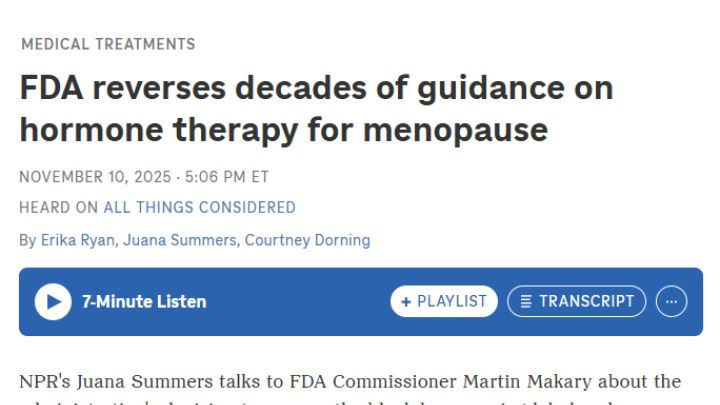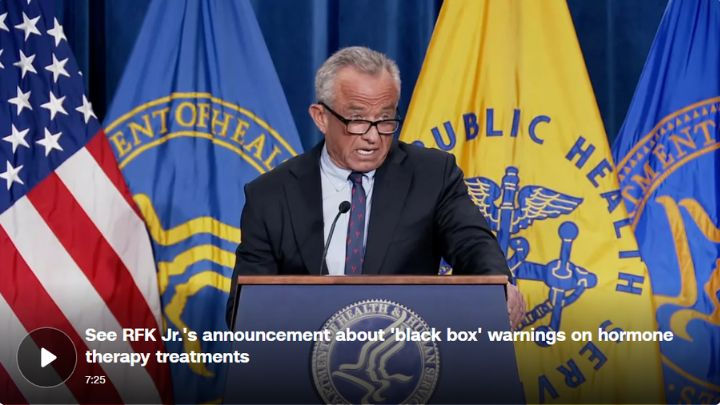FDA Removes Decades-Old Black Box Warning for Hormone Therapy in Menopause Care
- Nov 11, 2025
- 3 min read

The treatment landscape for millions of women entering midlife shifted dramatically on November 10, 2025, as the Food and Drug Administration (FDA) announced its intention to remove the highly restrictive Black Box Warning (BBW) labels from hormone therapy products. This reversal affects all-combined estrogen-progestogen, estrogen-only, other estrogen-containing, and progestogen-only treatments used for Hormone Therapy in Menopause.
FDA Commissioner Marty Makary asserted that the agency is acting to "stop the fear machine steering women away from this life-changing, even lifesaving, treatment". The BBW was initially placed on these products in 2003, following the results of the 2002 Women’s Health Initiative (WHI) study. The study suggested an increased risk of heart disease and breast cancer, primarily with combination therapy among older postmenopausal women. Makary noted that this initial finding, which made a "big splash" in the media, effectively "scared women out of hormone replacement therapy". Subsequent analysis revealed that the estrogen-only group in the WHI study showed a lower rate of breast cancer, underscoring the "nuance" that was lost in the broad interpretation of the results.
The FDA’s decision is based on a robust review of current scientific evidence, which demonstrates the treatments' significant therapeutic value. Officials stated that these treatments offer heart, brain, and bone health benefits. In fact, FDA officials wrote in JAMA that, with the exception of antibiotics and vaccines, "there may be no medication in the modern world that can improve the health outcomes of older women on a population level more than hormone therapy".
The benefits of utilizing Hormone Therapy in Menopause are both immediate and long-term. In the short term, these therapies alleviate debilitating menopausal symptoms, including hot flashes, night sweats, mood swings, difficulty sleeping, and pain with sexual activity (vaginal dryness). Long-term data is equally compelling: the therapy reduces the risk of bone fractures later in life by 50–60%. It has also been shown to reduce cognitive decline by up to 64% and decrease the risk of Alzheimer's by 35% in one study. The profound cardiovascular protective effect of estrogen is evident when therapy is started within 10 years of the onset of menopause, leading to a noted 30% to 50% reduction in heart disease.
The removal of the BBW initiates a "meaningful shift toward more nuanced, evidence-based communication". The new labeling will include updated information recommending that systemic Hormone Therapy in Menopause is best initiated under age 60 or within 10 years of menopause onset. While adverse event information will remain in package inserts, taking a tailored approach to specific formulations, only one boxed warning will be retained: for the risk of endometrial cancer when a woman with a uterus takes systemic estrogen without sufficient progestogen ("unopposed estrogen").
The process itself was unconventional, as the FDA opted against the traditional, long, and expensive scientific advisory committee meeting. This change has been largely welcomed by clinicians and patient advocates who believe the previous warning discouraged millions of women from accessing the treatment. As Makary explained, the agency is now focusing on getting "better information in front of women".
🌐 External sources
Keywords: Hormone Therapy in Menopause











Four years ago, my husband was diagnosed with IPF (Idiopathic Pulmonary Fibrosis), a moment that changed our lives significantly. For more than two years, he followed his prescribed medications and attended regular medical checkups. Despite this, his symptoms persisted, and we remained concerned about his overall health. He struggled with low energy, frequent discomfort, and the emotional stress that came with ongoing uncertainty.In search of additional support, we decided last year to explore a herbal treatment program offered by NaturePath Herbal Clinic. We approached it cautiously and without high expectations. Over time, however, we began to notice encouraging changes. His tiredness eased, his digestion became more stable, and he appeared stronger and more at ease overall. Little by little, his…